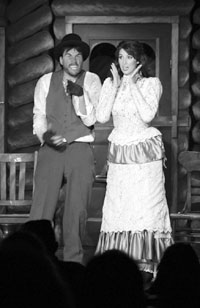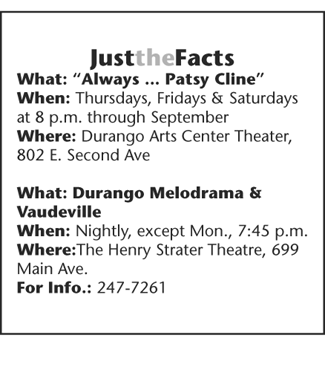|
| ||||||
| Theater reigns supreme in summer
by Stew Mosberg
First, a 48-year-old piece of Durango history recently returned to the Henry Strater Theatre. To welcome the Melodrama back to its Durango roots, The Hank deliberately selected George M. Cohan’s classic, “The Tavern,” which was the theater’s inaugural show performed for the opening in 1962. According to Rod Barker, the Strater Hotel’s owner and the play’s chief producer, “We felt it appropriate to bring this play back, because we’re at a new beginning at the Henry Strater Theatre and because it is an uncomplicated play featuring some very complicated characters.” Typical of the melodramatic entertainment of days of yore, this romp has its share of humor and pathos as well a complex series of events that were written to keep audiences guessing “Who done it?” Bryan Rasmussen, a Coloradoan by birth, has returned to Durango to direct at the historic Strater and has dedicated this production to the memory of his brother Larry Rasmussen, a long-time Durango native. Bryan also has a small but pivotal role in the show as the Sheriff. Among all his plays, and his only non-musical, the 1920 production of “The Tavern” was Cohan’s favorite, and he took the central role as the Vagabond in the original production. In a review at the time, the infamous Dorothy Parker of the Algonquin’s Round Table fame said about Cohan and the play, “Mr. Cohan has done immeasurably more by adding those mastering touches, which no other living playwright could add.” The appraisal is certainly fitting for this revival and puts it into context of the era. One of a handful of authentic Melodrama theaters remaining in the United States, the Strater’s shows are performed using the original scripts. The show offers some tongue in cheek, inserting Florida Road and Goeglein Gulch into the dialogue for instance, plus a lot of histrionics. Booing, hissing and cheering, along with obligatory gasps are encouraged. The evening’s entertainment ends with an old-fashioned vaudeville revue. It is performed by the very same actors, who not so incidentally also wait tables before the curtain and during intermission. All 12 actors produce moments of hilarity and help create an atmosphere of total farce, but they truly shine during the end-of-the-show skits. One of the outstanding features of the Melodrama Theatre is its musical director and virtuoso performer, Darryl Kuntz, a local treasure trove of talent. At times remindful of Herb Shriner and Victor Borge, Kuntz warms up the crowd, entertains, keeps them laughing, and adds immeasurably to the evening’s experience. On the other side of downtown, the Durango Arts Center Theater presents Traci Lyn Thomas and Mary Ellen Cerroni in “Always ... Patsy Cline.” The musical is a tribute to the legendary Cline who left behind a legacy of country hits that remain as popular today as they were in the early 1960s.
The 1993 play written by Ted Swindley, was based on Honky Tonk Angel, a book by Ellis Nassour tracing the true story of Cline’s friendship with Louise Seger, an early and ardent fan. The two-act play chronicles the written correspondence between the two women up until Cline’s untimely death. Traci Lyn Thomas captures Cline’s mannerisms, vulnerability and voice through 27 of the country star’s songs. In a magnum opus performance, she manages to embody Patsy’s personality so well that now, after 50 years, it is hard to believe you are not watching the genuine article. With her comparably heartfelt delivery of Cline’s personalized lyrics, Thomas evokes the empathetic phrasing of the original arrangements. To keep it from becoming a mournful epitaph, the play has its comedic relief through Cerroni’s energy and over-the-top, all-over-the-stage and into-the-audience theatrics. When she joins Thomas for two duets, it is easy to see that both actors are multi-talented, seasoned stage veterans, who are clearly enjoying themselves. The audience gets so caught up in the show that they clap and hoot along with the more rousing numbers The closing gambit, designed no doubt to leave the crowd uplifted rather than morose, is a surprise and successfully achieves its desired affect. The play showcases Thomas’ performance as much as it does Patsy Cline because after more than two dozen songs, the audience still clamors for more. The challenges faced by Director Teresa Carson, a theatrical virtuoso in her own right, included a rehearsal period of only 2½ weeks, with a compact five hours a day to work through the lines, the songs, the music, the staging, the lighting, the costuming by Diane Welle, and the retro set by Mona Wood-Paterson. Creating the illusion of additional players without them actually being on stage was tricky enough, but even more difficult was establishing the bond between a disparate pair of women. The subtleties that Carson instilled into brief moments of interaction between the two characters speaks volumes. “Patsy,” said Carson, “found something in Louise she didn’t have in herself. It filled a space.” Considering what is achieved beyond the obvious entertainment factor, Carson took a cerebral approach to portray what she refers to as “A life-changing event for the two women.” This particular “Always ...” is a manifestation of Teresa Carson’s talent as much as it is of Thomas’ and Cerroni’s. •
|
In this week's issue...
- May 15, 2025
- End of the trail
Despite tariff pause, Colorado bike company can’t hang on through supply chain chaos
- May 8, 2025
- Shared pain
Dismal trend highlights need to cut usage in Upper Basin, too
- April 24, 2025
- A tale of two bills
Nuclear gets all the hype, but optimizing infrastructure will have bigger impact



 Two very different but thoroughly entertaining plays are filling seats in Durango and will do so throughout the summer.
Two very different but thoroughly entertaining plays are filling seats in Durango and will do so throughout the summer.
